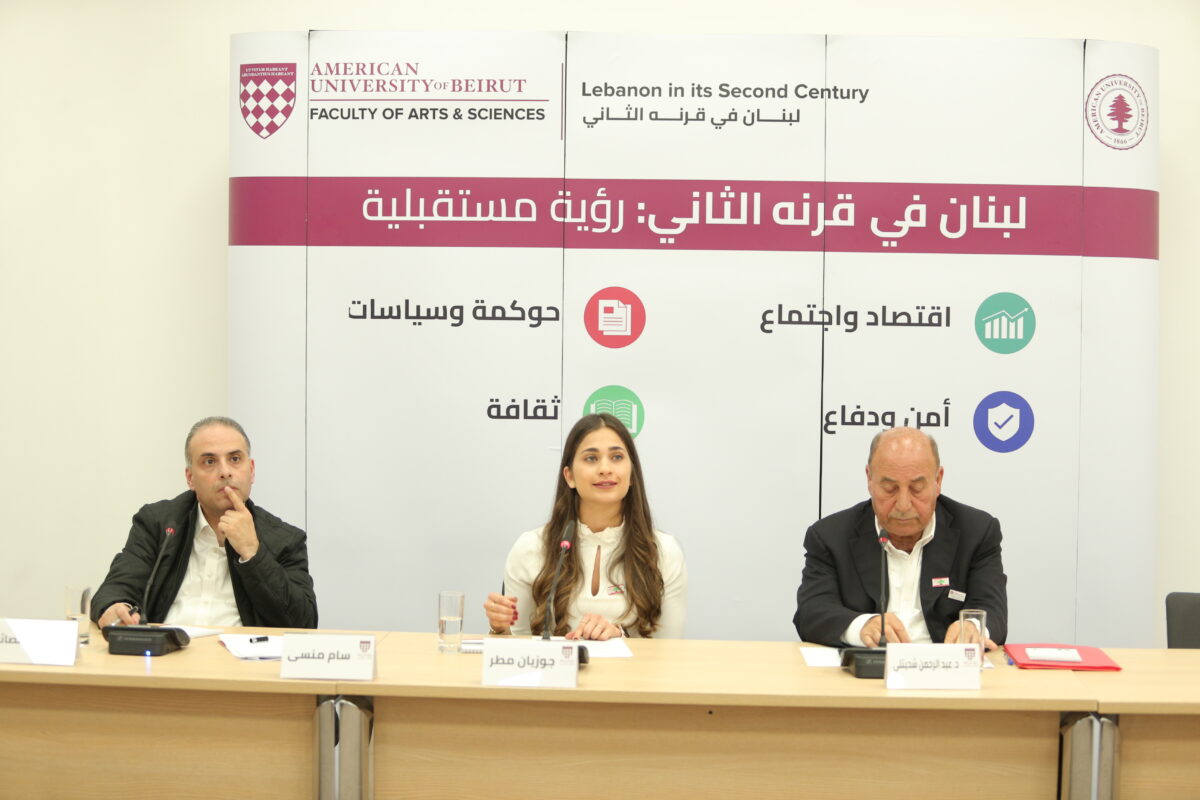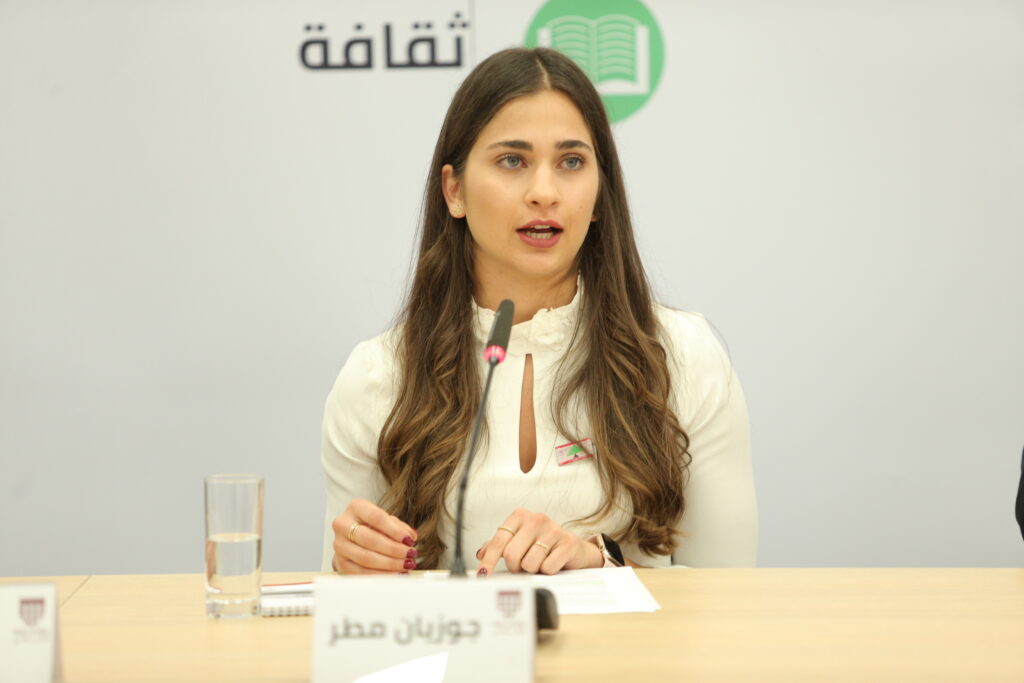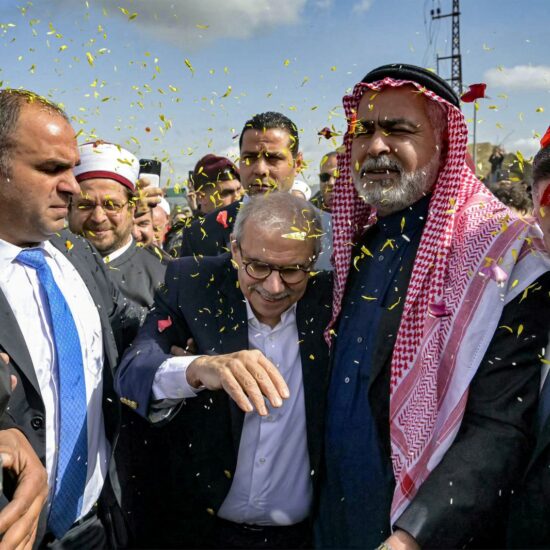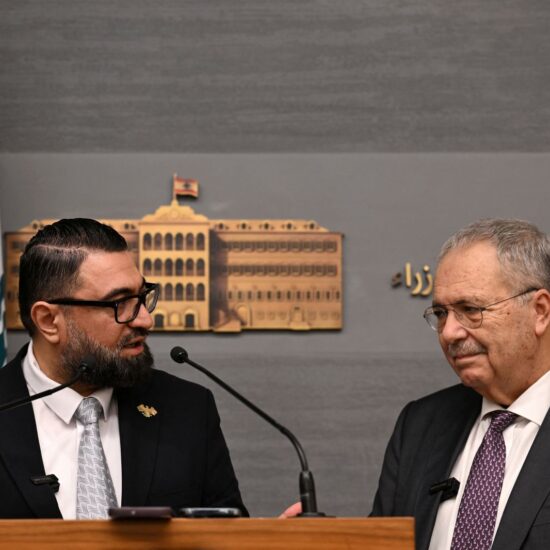
The seminar series’ second day, titled “Lebanon a refuge, a corridor or a residence?” looked at sovereignty and the question of Syrian refugees.
Themes regarding sovereignty challenges and socio-security parameters due to the Syrian exodus in the last decades were at the forefront of the second day of AUB seminars series: “Lebanon in its Second Century: A Forward Vision”, which kicked off on sept 9. The sessions brought forward many concerns on Lebanon’s sovereignty while trying to answer its role in the region as a gateway for refugees or a corridor for cold wars or if it had fulfilled its role as an independent nation autonomous state. Economic challenges have pushed Syrians in the country into poverty with more than 90 percent of refugees reliant on humanitarian assistance to survive. Unconfirmed figures say there are 1.5 million Syrian refugees in the country, 950,000 of whom are registered with the United Nations Higher Commission for Refugees (UNHCR), a figure that is threatening the fragile socio-political nexus of the country. In this troubled context, a multifaceted approach is essential to address the political, sovereignty, economic, and socio-economic challenges, along with exploring pathways of cooperation with the United Nations and other international organizations and donors.
The “Lebanon in its Second Century: A Forward Vision” discussions were launched last month through an initiative of the American University of Beirut, the Faculty of Arts and Sciences, and the Department of History and Archaeology. The panels will stretch until March2023.
The second day of the discussions themed “Lebanon a refuge, a corridor, or a residence” included three sessions:
“The political-sovereign challenges the Syrian presence incurs on Lebanon” was delivered by Dr Ziad Al-Sayegh Policy expert in public affairs, asylum, and migration. High on his agenda is how the rights of Syrian refugees to return to their homeland and country must be acknowledged in a sovereign context, providing protection for their national identity and social fabric.
Brigadier Dr. Abdul Rahman Chheitly, Director-General of Administration at the Ministry of Defense, and former representative of the Lebanese government with UNIFIL addressed the second session which theme hovered around “security challenges and the role of Lebanese governance and institutions in regulating and monitoring refugees”
The last session underlined “paths of cooperation with the United Nations and the options Lebanon has to manage the exodus,” while keeping good governance relations with international organizations. Jozianne Matar Ph.D. candidate in Migration Studies at the University of Oxford. Sam Menassa moderated the sessions.
Since 2011, Lebanon has been facing an unprecedented crisis of Syrian displacement, accompanied by a lack of proper governance from successive Lebanese governments, Menassa said. This situation has been further exacerbated by interference from the ruling powers in Syria, hindering the return of refugees. Simultaneously, the international community has failed to establish a political solution that contributes to their return with legal, security, economic, and social guarantees. According to Menassa Lebanon has failed to manage the Syrian exodus crisis, a matter accentuated by the absence of political consensus over the cause of the exodus. Lebanon remains by far the country where the exodus has been accentuating. The examination of various scenarios should aim to steer the outcomes of this tragedy, sparing Lebanon’s national security from existential repercussions and safeguarding its human population from identity-related risks.
The failed management of the crisis
Th successive governments have failed to manage the Syrian exodus and unfortunately have engendered many dilemmas to policy makers Ziad Sayegh stated in the first panel. According to him, the primordial dilemma is the understanding of this crisis from an ideological point of view the second is that there is no real census on the number of refugees henceforth there is no real assessment over the magnitude of the problem. Also there is a real need to analyze the cause of the exodus and not just its outcome Sayegh believes. There is no national consensus over this problem hence the disagreement has engendered an international and local quiproquo over this matter, he adds.

Dr. Ziad Sayegh
Hence according to Sayegh the understanding of the issue can be positioned over the following questions whose answers can be a road map for the management of the Syrian displacement crisis:
- How can we provide international guarantees for a harmless return of the Syrian refugees to safe zones?
- Why did the government failed to register the refugees and classified them according to their reason of being in Lebanon ( refuges, workers, …) ?
- Why did the registration of Syrian births started only in 2018 and not before?
- Why didn’t the government called for a memorandum of understanding with the international organizations over the issue and therefore called for an Arab league meeting to debate the intensity of the issue.
Addressing all these dilemmas would have created an institutional support framework for Lebanon to manage the crisis Sayegh quoted.
The Syrian presence in Lebanon narrative has been categorized as a “conspiracy narrative” Sayegh said hence the ambiguity of addressing the issue in international arenas and amongst local parties and circles.
Accordingly on the medium and long term there are three alternatives to deal with the issue of the repatriation of the refugees ; the first option is the “do nothing” alternative since security conditions in Syria are still not ripe , second the “full return” option with political and international guarantees for a safe medium, and finally a step-by-step return to safe zones, a deal which will involve all actors namely the Arab league the United Nations and international organizations.
If all these are to be taken into consideration therefore the government has to resort to a census of the Syrian refugees and proceed to appeal to all actors to help in the repatriation he said.
The security issue
In his lecture Brigadier Dr. Abdul Rahman Chheitly addressed the issue of the military in dealing with the Syrian exodus. According to him the military is ill equipped to fulfill such a role since its resources are going scarce. “The military face a logistic problem when asked to deal with some two million refugees” he said. There is a need to solve this issue in political discussions between two states the Syrian and the Lebanese on a high representation level he added.

Dr. Abdul Rahman Chheitly
We face several security challenges in Lebanon Chheitly stated. Firstly, on the southern Lebanese border, the war in Gaza led to clashes just before the actual ceasefire. According to him there are significant challenge for the Lebanese army to stretch over the whole territory he said. Secondly, there’s the challenge of the eastern borders and the inability to control them effectively. Thirdly, there’s the challenge of crimes occurring in the country through terrorist cells, placing burdens on the security forces. Lastly, there’s the security challenge on the maritime borders, represented by smuggling facilitated by criminal networks.
Therefore, studying all scenarios is crucial to deal with the situation. Organizing the presence of displaced individuals by providing them with identification cards as refugees and regulating their return by distinguishing between those capable of returning and those unable to, such as political refugees, is an alternative which can classify the refugees, Chheitly said. Also, establishing a special court for Syrians could alleviate pressure on the judiciary. There is a need to deal with the security issues that the Syrian presence imposes on Lebanon he concluded.
Cooperation with international organizations
In the third session, Jozianne Matar, a doctoral candidate in Migration Studies at the University of Oxford, discussed avenues of cooperation with the United Nations and options for proper governance. She mentioned that Lebanon should have acted along the 1951 convention on refugees’ rights. The core principle of the 1951 Convention is non-refoulment, which asserts that a refugee should not be returned to a country where they face serious threats to their life or freedom. Article 1 of the 1951 Convention defines a refugee as someone who “owing to well-founded fear of being persecuted for reasons of race, religion, nationality, membership of a particular social group or political opinion, is outside the country of [their] nationality and is unable or, owing to such fear, is unwilling to avail [themselves] of the protection of that country; or who, not having a nationality and being outside the country of [their] former habitual residence, is unable or, owing to such fear, is unwilling to return to it.”

Jozianne Matar
Lebanon henceforth adopted a policy of “non-policy”, aiming to ensure support from donor countries amid the Syrian crisis and the European Union’s desire to keep refugees away, Matar stated. This was done by continuing support from host countries. However, the United Nations faces constraints hindering its ability to work on the ground—structural limitations and local challenges, Matar said. Lebanon received over $9 billion to support the poorest families, but due to the currency present jeopardy and the economic crisis, the UN suffered losses of around $250 million according to Reuters she stated. To be noted Lebanon Jordan and Turkey did not sign the 1951 declaration.
According to her while European support focused on refugees’ basic needs, there was insufficient emphasis on integrating them into the job market through multiple generous donations. Thus by, the international community has demonstrated its failure to protect and preserve human rights. As for the government the solution should solely come solely from the United Nations in the absence of an efficient role of the government. The displacement problem is not just between Lebanon and Syria but within Lebanon itself due to existing divisions she believes.
Lastly there is a need for refugees to decide on their fate she said. The issue is sensitive but it adhere to basic human rights principles.
Maan Barazy is an economist and founder and president of the National Council of Entrepreneurship and Innovation. He tweets @maanbarazy.
The views in this story reflect those of the author alone and do not necessarily reflect the beliefs of NOW.








